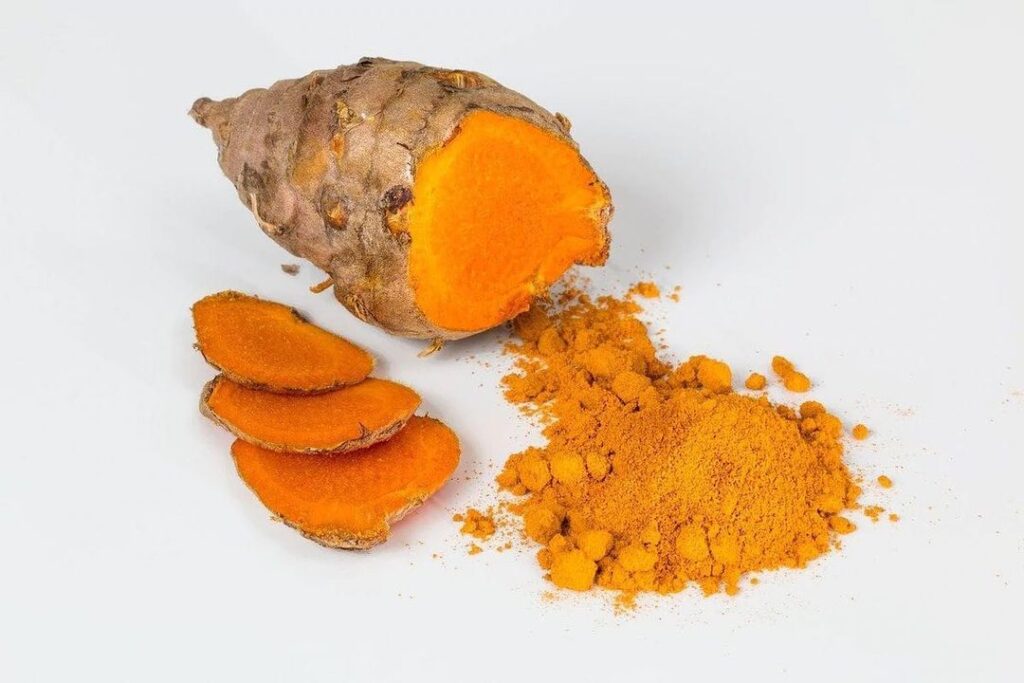Do you have any idea what turmeric is good for? In food and medicine, it has a long history of usage in India as a natural remedy, dating back hundreds of years.
One of the most potent plants on the planet, turmeric may be found in various herbal preparations. Although it has been known for quite some time that it had therapeutic characteristics, it was only very recently that modern science confirmed many of the traditional applications of this plant.
Table of Contents
Turmeric is good for?

Spice turmeric is beneficial to one’s health. For hundreds of years, people in China, Southeast Asia, and the Indian subcontinent have been eating and taking medicinal benefits from this plant. It has been shown that turmeric has several qualities that are helpful to health, including anti-inflammatory, antioxidant, and anti-cancer capabilities.
Turmeric is also known as Curcuma longa, curcuma domestica and curcuma aromatica. Both for its culinary applications in Asian cuisine and for the medicinal benefits it offers, this plant is native to the tropics and grows all over the world. The active component in turmeric is called curcumin, which accounts for around 3 percent of the total weight of the spice.
Curcumin, the active component in turmeric, is responsible for the spice’s characteristic yellow hue. Researchers believe that curcumin is responsible for most of the beneficial health effects associated with turmeric throughout the years.
Because it includes curcumin, which has been proven to have many different beneficial effects on one’s health, turmeric is an excellent spice to add to one’s cuisine.
Because of its anti-inflammatory and antioxidant qualities, curcumin may help reduce the risk of developing illnesses such as Alzheimer’s, arthritis, cancer, and heart disease. Additionally, it may help relieve the painful symptoms of some types of arthritis.
Additionally, due to the presence of antioxidants, turmeric may enhance eyesight and protect against macular degeneration. Find out what turmeric is good for.
Health benefits of turmeric and what turmeric is good for
It has a rich orange hue that tastes warm and earthy. The anti-inflammatory properties of turmeric make it a useful therapy for several health issues.
Turmeric is good for: Turmeric contains medicinally active bioactive chemicals
However, turmeric’s curcumin concentration could be a lot higher—approximately 3%, by weight. Most investigations on this plant use curcumin-rich turmeric preparations, with doses often surpassing 1 gram per day. However, the absorption of curcumin into the bloodstream is low. To enjoy the full benefits of curcumin, its bioavailability must be maximized.
Turmeric is good for: Depression

Several chemicals in turmeric may provide health benefits. Curcumin is the most well-known of them. Scientists are enthusiastic about curcumin’s potential to alleviate depression and improve the efficacy of antidepressants. However, study outcomes so far have been mixed.
Turmeric is good for: Naturally occurring anti-inflammatory agent
Inflammation is of paramount importance. It aids in warding off foreign invaders and mending harm to the body.
Although acute, short-term inflammation is beneficial, persistent inflammation that affects the body’s tissues may be problematic.
Scientists now think that persistent low-level inflammation may play a role in various illnesses and health issues. These consist of the following:
- Cardiovascular disease
- Cancer Syndrome
- Alzheimer’s disease
- other degenerative disorders
Turmeric is good for: Type 2 Diabetes
Turmeric might be beneficial for preventing or treating type 2 diabetes due to its anti-inflammatory and blood sugar-stabilizing properties. Following 240 persons with prediabetes for nine months, one research revealed that supplementation with curcumin reduced their risk of developing diabetes. The research is continuing, although most studies so far have been conducted on animals and not humans.
Turmeric is good for: Boosting the body’s antioxidant capacity
It is considered that oxidative damage is one of the causes of aging and other illnesses. It involves extremely reactive compounds with unpaired electrons, known as free radicals. Free radicals often react with vital chemical compounds, such as fatty acids, proteins, and DNA.
The primary benefit of antioxidants is that they protect the body from free radicals. Curcumin is a strong antioxidant whose molecular composition allows it to destroy free radicals. Curcumin may stimulate the production of brain-derived neurotrophic factors. Before scientists had a better knowledge of neurons, it was thought that they couldn’t split and increase beyond early infancy. They now understand that this is not the case.
Neurons can make new connections and may grow and increase in number in particular brain regions.This gene is involved in producing a protein that promotes the survival of neurons.
Turmeric is good for: Premenstrual Syndrome
Recent research that followed women for three consecutive menstrual cycles revealed that curcumin pills alleviated PMS symptoms. Research on the muscles of guinea pigs and rats indicates that turmeric may also relieve menstruation cramps.
Turmeric is good for: Inflammatory Bowel Syndrome

As with many of the topics discussed, further investigation is required. Early studies, including a pilot trial with 207 individuals and another involving rodents, indicate that turmeric may help alleviate IBS symptoms, including stomach discomfort. Turmeric is also being investigated as a potential therapy for Crohn’s disease and ulcerative colitis.
Turmeric is good for: Acne

Some individuals believe that applying a turmeric mask to their face or consuming turmeric would help them with persistent acne, perhaps due to the spice’s antibacterial and anti-inflammatory characteristics. Unfortunately, there is no scientific evidence to support this.
Turmeric is good for: Reducing the risk of cardiovascular disease
Researchers have researched this phenomenon for decades and learned much about its causes. Unsurprisingly, heart disease is intricate, and several factors contribute to its development.
Improving the endothelium’s function and lining of your blood arteries may be the most significant effect of curcumin on heart disease.
Turmeric is good for: Slow aging and protecting against age-related chronic illnesses
If turmeric can effectively prevent cardiovascular disease, cancer, and Alzheimer’s, it may also promote lifespan. This indicates that curcumin may have an anti-aging potential as a supplement.
Since oxidation and inflammation are considered to play a role in aging, curcumin may have far-reaching benefits beyond disease prevention.
Turmeric side effects
Although there are turmeric is good for other things, some individuals may be concerned about its adverse effects of turmeric. In general, the plant itself is thought to be safe for human consumption.
The root plant in ginger called Curcuma longa is where turmeric gets its color and flavor. Since the beginning of Ayurvedic medicine, which dates back thousands of years, turmeric has been utilized as a treatment for various illnesses. Today, it is also used as an additive in food and as a natural cure for multiple conditions that affect one’s health.
Some individuals may have moderate adverse effects when taking supplements containing turmeric or consuming meals that include a significant quantity of this spice.
Nausea, diarrhea, and stomach ache are potential effects of these side effects. However, if you stop taking the supplement or consume substantial quantities of foods high in turmeric, such as curry powder or turmeric tea, these symptoms should only endure for up to two days.
Turmeric as a natural anti-inflammatory
Traditional Chinese medicine uses turmeric, which has a natural anti-inflammatory effect and has been doing so for thousands of years as an ingredient. Ayurveda, the traditional medical practice in India, also makes use of it.
The root of the Curcuma longa is the source of the spice known as turmeric, which is a member of the ginger family. It acts as both an anti-inflammatory agent and an antioxidant, which may help decrease inflammation in the body and prevent cell damage caused by free radicals. This is one of the many ways it contributes to a healthy body.
Curcumin, turmeric’s primary active component, is a potent antioxidant that has also been shown to have anti-cancer benefits. It also protect against heart disease by reducing blood pressure and cholesterol levels, which is how it does its protection.
FAQs
What are the benefits of turmeric?
The capacity of turmeric to facilitate digestion is one of the advantages of turmeric that receives the most attention. Many people take it before meals as an antacid, which helps avoid indigestion after eating fatty foods like meat or dairy products, which may create gas or bloating if they aren’t digested correctly before they reach the intestines. This is why a lot of people take it.
Is it good to take turmeric everyday?
Many individuals use turmeric daily, and the majority of people feel it to be safe. However, pregnant or nursing women should not take it since there is insufficient evidence of its effects on these populations.
Consult your physician before consuming turmeric if you are already using prescription medicines. It may also interfere with any herbs or supplements you take, so consult your physician before introducing any new foods or medications into your diet.
What are the 10 benefits of turmeric?
It can aid in cancer prevention. It may reduce inflammation. It aids in the treatment of digestive problems and other gastrointestinal difficulties.
It may aid in preventing Alzheimer’s disease, dementia, and cognitive decline. Reduces inflammation and oxidative stress to treat skin disorders such as psoriasis and eczema. It enhances your mood. It accelerates wound healing by preventing infections. It may facilitate weight loss.
Conclusion
Now that you found out what turmeric is good for. It has shown positive characteristics and may be the key to improved health. Turmeric is a potent spice that has several health advantages. One of the most excellent things about turmeric is that it may enhance your immune system and increase the efficacy of other drugs you may be taking. Considering all of these advantages of turmeric, it’s easy to see why it’s become such a popular spice in contemporary culture.

